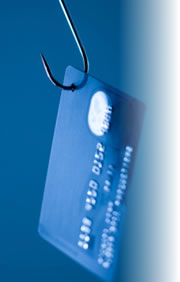Credit Card Scams: First There was Phishing, Now There are Vishing and Smishing

You probably have heard about phishing–the scam in which crooks send out phony e-mails purporting to be from banks or credit card companies, and ask for personal financial information. These scams direct you to Web sites that are set up to steal account and PIN numbers you enter, thinking you’re communicating with your financial institutions.
But are you prepared to protect yourself against vishing? What about smishing?
The terms may sound like nonsense from a children’s book, but these new cyber crimes are robbing serious money from thousands of victims across the country.
Credit Card Account Information at Risk
Vishing–a combination of “voice” with “phishing”–uses the telephone network to steal information from consumers. Today with VoIP, or voice-over Internet Protocol, technology, it’s easier for crooks to hack into the phone system. Scammers use a trick called caller ID spoofing, which makes it look like the call is coming from your credit card company or bank. The calls are usually recordings, which tell you to call an 800 number. Once you call that number, you’re directed to punch in your credit card number or other personal information.
Smishing, which combines “short message service” with “phishing,” uses text messages over cell phones to get consumers to reveal financial information. Crooks use auto-dialing or roll-texting computer programs to send out thousands of text messages. MyWireless.org, a consumer advocacy coalition, warns consumers the message might say something like, “Notice! Hurry, your credit card has been deactivated or suspended, go to this Web site to get help!” If you hit “send” to visit the Web site, you unknowingly open yourself to fraud. Crooks can use the Internet connection to attach spyware, viruses, or spam to access your personal information through your device. Or sometimes, the text message gives a number to call, where you are asked to give your personal information to a live person or recording that is posing as your bank or credit card company.
Protect Credit Cards From Cyber Crime
Follow these tips to protect your information:
• Never respond to a text or telephone message offering credit card deals or requesting account information.
• Call your credit card company directly, using the number on the back of your card or on your billing statement.
• Don’t ever give personal information, such as your credit card number, over the phone unless you’ve placed the call to the financial institution, using the number listed on your account.
• Contact your credit card company immediately if you think you’ve been a victim of phishing, vishing or smishing.
Disclaimer:The information in this article is believed to be accurate as of the date it was written. Please keep in mind that credit card offers change frequently. Therefore, we cannot guarantee the accuracy of the information in this article. Reasonable efforts are made to maintain accurate information. See the online credit card application for full terms and conditions on offers and rewards. Please verify all terms and conditions of any credit card prior to applying.
This content is not provided by any company mentioned in this article. Any opinions, analyses, reviews or recommendations expressed here are those of the author’s alone, and have not been reviewed, approved or otherwise endorsed by any such company. CardRatings.com does not review every company or every offer available on the market.
Published (Modified )